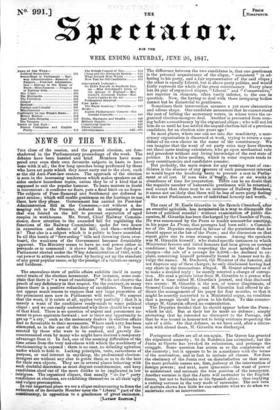The anomalous state of public affairs exhibits itself in many
novel traits of the election mbsement. For instance, some com- plain that there is " a want of candidates." We do not observe the proofs of any deficiency in that respect. On the contrar7, in many places there is a positive redundancy of candidates. • Mere does not appear much reason to suppose that any large proportion of the prominent men now in Parliament will retire. We suspect that the want, if it exists at all, applies very partially ; that it is merely a want of the candidates ready-made to some political clique : and we can easily understand why there should be a want of that kind. There is -no question of urgent and paramount in- terest to press aspirants forward ; nor is there any opportunity to get up " a cry," such as the mercenary dealers in election affairs find so favourable to their movements. Where such a cry has been attempted, as in the case of the Anti-Popery cant, it has been scouted by those who were to be coerced, and gravely dis- countenanced even by many who might have derived a temporary advantage from it. In fact, one of the seeming difficulties of the time arises from the very nakedness with which the machinery of electioneering is exposed : there is no cant, no deluding agitation under which to hide it. Lacking principles, taste, earnestness of purpose, or real interest in anything, the professional election- mongers are without any clue to guide them so as to do the best for their own objects. They are in several places behaving with such doubtful discretion as must disgust constituencies, and keep c. andidates aloof out of the mere dislike to be implicated in low intrigues. The organized cliques, that usually " do for " party candidates at elections, are exhibiting themselves in all their ugly and vulgar presumption.
In one important place we see a clique endeavouring to force the reelection of its favourite Member upon the " Liberal " part of the constituency, in opposition to a gentleman of great eminence. The difference between the two candidates is, that one gentleman is the personal acquaintance of the clique, " consistent " in ad- hering to his party, and a fair representative of the said clique; the other is equally Liberal, but is above party politics, and would fairly represent the whole of the great constituency. Every place has its pair of organized cliques, "Liberal" and " Conservative," not superior in elements, often vastly inferior, to the one in question. Now, the having to deal with these intriguing bodies cannot but be distasteful to gentlemen.
Sometimes their intervention assumes a yet more obstructive and odious shape. One candidate announces that he cannot stand the cost of bribing the mercenary voters, in whose votes the or- ganized election-mongers deal. Another is prevented from coin- ing before a constituency by the organized clique ; who will not let him do so until he has settled the unpaid election-bill of a previous candidate, for an election nine years ago In most places, where one can see into the machinery, a mer- cenary organization is discerned at work, trying to return a can- didate of its own choice in the name of the constituency. We can imagine that the want of set party cries may have thrown out these mere trading calculators, who go upon mechanical rule and precedent without any living knowledge of the real state of politics. It is a false medium; which in some respects tends to keep constituencies and candidates asunder.
But probably, the main on for any seeming want, of can-
didates is the absence of any sure of such paramount interest as would beget the headlong ste to procure a seat in Parlia- ment at all cost. If men take it 1 , five or six weeks is abundance of time for preparation. re can be no doubt that
the requisite number of honourable gentlemen will be returned ; and, except that there may be an increase of Railway Members, it seems not unlikely that there will be less of mere party feeling in the next Parliament, more of individual honesty and worth.


























